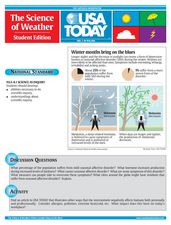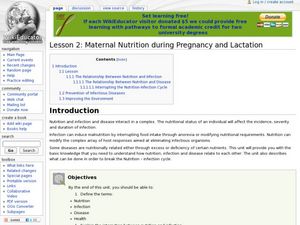Nemours KidsHealth
Depression: Grades 6-8
Over two lessons, scholars examine depression—what it is, signs of it, and ways to cope. Through discussion, reading articles, writing a resource, and completing worksheets, participants make their way through the learning process,...
Purdue University
Healthy Body Image: A Lesson Plan for Middle School Students
This is a very valuable lesson for middle schoolers on the importance of maintaining a healthy body image through diet, exercise, and positive mentality. The resource includes four lesson plans. The first two plans outline the physical...
Nemours KidsHealth
Stress: Grades 6-8
Two lessons take a close look at stress. In lesson one, scholars identify common stressors and examine stress management strategies. Lesson two challenges pupils to keep a stress log for four weeks to aid in their personal journey of...
Nemours KidsHealth
Suicide Prevention: Grades 6-8
Suicide prevention—a heavy topic but an important one. Over two lessons, pupils gain knowledge about suicide, particularly in teens, and how to advocate for a friend who feels suicidal or depressed. After researching the topic, scholars...
Curated OER
Fighting the War in Your Head
Students analyze the experiences of a fictional soldier in a war and create a mental health profile for that individual. They emulate psychiatrists and propose treatment strategies for their particular soldier's post-traumatic stress...
Curated OER
Dysfunctional Eating
Sixth graders study the concept of dysfuctional eating including anorexia nervosa, bulimia nervosa, binge eating disorder, fad dieting, and having an unbalanced diet. They watch and discuss videos about eating disorders and then they...
Curated OER
The Science of Weather
Learners read an article. In this seasons lesson, students discuss the seasons and seasonal affective disorder. Learners find an article that illustrates other ways that the environment negatively effects humans.
Curated OER
Real Attractive
Sixth graders create a collage of attractive people. They write about what makes these people attractive. They discuss what makes someone attractive. They research eating disorders and how the media impacts what people deem as attractive.
Curated OER
Maternal Nutrition during Pregnancy and Lactation
Students explain the relationship among nutrition, infection and diseases. In this health science lesson, students suggest ways to break the nutrition-infection cycle. They brainstorm solutions to prevent infectious diseases in the...
Curated OER
Dysfunctional Eating
Sixth graders write a 1.5 page paper explaining how to make their favorite nutritional snack. They need to assume that the audience has never seen or heard of the snack before.
Curated OER
Eating Well and Keeping Fit
Students look at statistics that show children who are overweight are increasing in our society. Students chart out ways to be physically active and how to eat a balanced diet. Students devise a menu/activity chart in light of what has...
Curated OER
How Can You Predict the Characteristics of an Unborn Baby?
Students compare three sets of unlabeled human chromosomes and gather related data, trace chromosomes to pair them, and make observations about them.
Curated OER
Sports Science
Students explore athletes and how they perform. In this physics lesson, students investigate how physics is involved in sports. Students go online to interactive sites that explain physics and biomechanics. Students also research and...
Curated OER
Show 303: New Research into Dyslexia
Students explore the causes of dyslexia. They view CT sans and MRIs to view the brain and how it responds. Students read reports about dyslexia. They discuss the nature of dyslexia, its cause, how to diagnose it, and its permanency.















